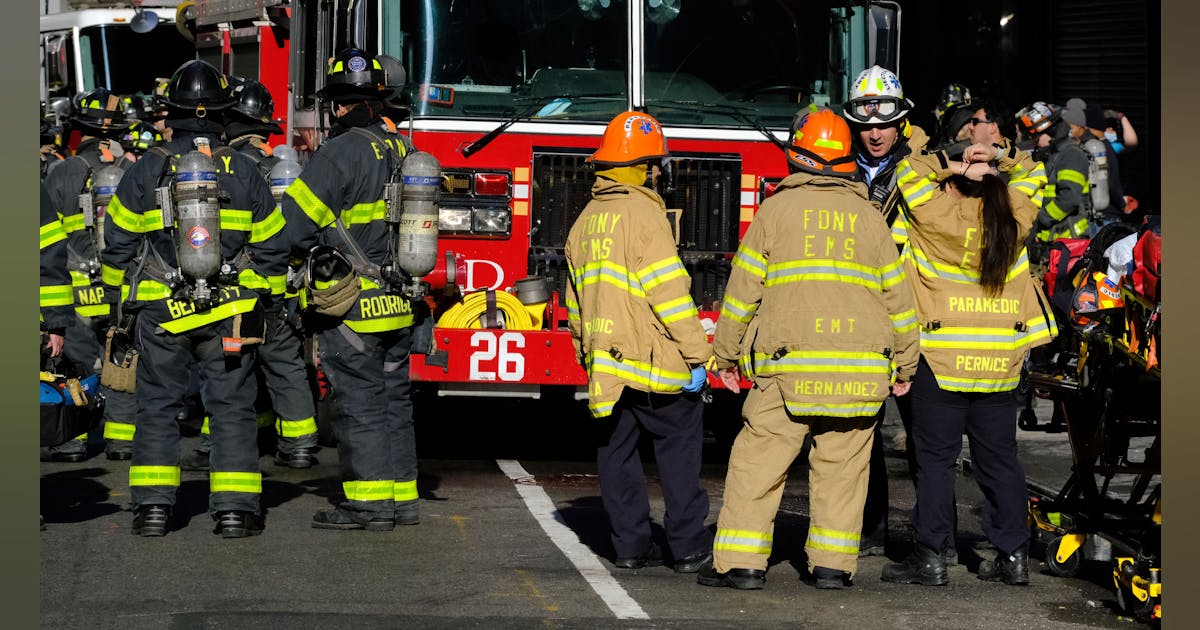EMS unions file lawsuit after EEOC reports pay gap between FDNY EMS providers, firefighters
The suit states the city suppressed the salaries of EMS providers and says their work is substantially equal to firefighters' work
Yesterday at 9:58 AM
By Thomas Tracy
New York Daily News
NEW YORK — The federal government wants the city to resolve the massive salary gaps between its firefighters, emergency medical technicians and paramedics — a bombshell determination that has become the backbone of a new class action discrimination lawsuit for equal pay among the city’s first responders, the Daily News has learned.
About 25 current and retired city Emergency Medical Service workers have signed onto the lawsuit, which centers around the U.S. Equal Employment Opportunity Commission’s decision that City Hall has “discriminated against current and former first responders of the FDNY’s EMS, based on race and sex, from at least November 8, 2018 to the present with respect to pay, benefits and terms and conditions of employment.”
View attachment 28750
FDNY EMS providers and firefighters were at the scene of a fire in Midtown Manhattan on March 9, 2021. (Photo/Luiz C. Ribeiro/Tribune News Service)
The feds recommended in December 2021 that the city “reach a just resolution of this matter” and opened the door for a potential lawsuit if the city “declined to enter into conciliation discussions.”
With no further movement on the issue, EMS unions stepped through that door on Dec. 7 with the class action lawsuit filed in Manhattan Federal court seeking to correct the pay disparity.
Citing the EEOC report, the 57-page suit argues that the city “suppressed the salaries of EMS First Responders despite the fact that they perform work that is substantially equal in the required skill, effort, responsibility, and working conditions as their fire side colleagues.”
As a result, EMTs and paramedics have suffered a “loss of wages, salaries and benefits, as well as emotional hardship and mental anguish,” the lawsuit notes.
EMS employees have been
historically underpaid compared to FDNY firefighters and other first responders since merging with the department in 1996.
The pay gaps between the two groups continue to this day, even though the EEOC determined that EMTs and paramedics work just as hard as their firefighting counterparts, something that was made abundantly clear during the COVID-19 pandemic.
“The investigation showed that workloads, working conditions, training, and risks to EMS first responders and firefighters are comparable, with a substantial degree of overlapping duties, especially with respect to medical emergencies,” according to the EEOC decision, which was completed after a two-year investigation. “The evidence further shows the two groups have comparable accountability and responsibility.”
Despite their interlocking duties with the firefighters, city EMTs and paramedics weren’t considered uniformed personnel until a 2001 City Council law was passed. The Council further intervened in 2020,
passing a resolution calling for EMS to be paid the same as firefighters, but the city has failed to take action, the EEOC decision noted.
Entry-level EMTs are paid a base salary of $39,386, according to the lawsuit. Within five years, their pay increases to $59,534. City firefighters start their careers with a salary of $43,904 that goes up to $85,292 after five years.
The
pay gaps continue throughout the EMS member’s career. EMS chiefs and commanders earn $135,053 a year while their counterparts on the fire side “who perform substantially equal work in skill, effort, responsibility, and working conditions” make $235,000 a year.
While the city’s firefighter force is mostly made up of white men, EMS is mostly people of color and has many women, causing a racial and gender disparity, the lawsuit added.
“EMS first responders work in the same conditions and perform at least as rigorous work and require at least as much training and effort, with at least as much regular hazards, if not more than, fire first responders,” the lawsuit said.
“Yet it is [the city’s] policy and practice to compensate the EMS first responders substantially less than their almost exclusively male and overwhelmingly white counterparts on the fire side of the FDNY,” the suit said.
“The injustice of pay inequity in the FDNY was not created by the current mayor or the current fire commissioner,” said Vincent Variale, president of Local 3621, which represents EMS lieutenants and captains. “But it is their moral and legal obligation to end it. Thanks to the work of the EEOC they have the opportunity to put this dark chapter of the FDNY behind us.”
Oren Barzilay, head of Local 2507, which represents rank-and-file EMTs and paramedics, called the EEOC decision “a historic moment for New York City’s emergency medical service members.”
An FDNY spokesman could not comment on the lawsuit, citing the ongoing litigation.
“The FDNY is committed to fair and equitable pay practices. The case is under review,” a Law Department spokesman said in a statement.
When pay disparity issues are raised, the FDNY says they’re not to blame and any pay increases are hashed out by the city and union negotiators at the bargaining table.
“I personally believe that they are not compensated as they should,” former Fire Commissioner Daniel Nigro
told a City Council committee in 2021 when asked why EMS isn’t receiving better wages. “But we don’t control the process.”
When she was the FDNY first deputy commissioner, current FDNY Fire Commissioner Laura Kavanagh was involved in the EMS union’s 2021 contract negotiations, which
led to a salary increase for EMS employees, including a 6% bump for all EMTs and paramedics who agreed to be trained to respond to mental health calls.
©2023 New York Daily News.


